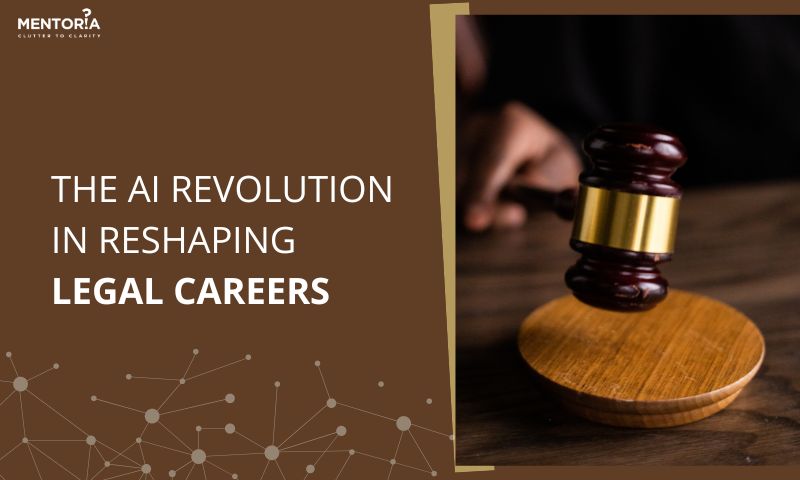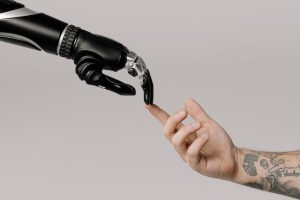The AI Revolution In Reshaping Legal Careers

Jump to Section
Whenever a professional sector faces new technology, questions arise about how that technology will disrupt the daily operations and careers of those who choose that profession. And lawyers and the legal profession are no exception. Today, artificial intelligence (AI) is beginning to transform the legal profession in many ways. But in most cases, it augments what humans do and frees them up to take on higher-level tasks like advising clients, negotiating settlements, and appearing in court.
Artificial intelligence imitates certain operations of the human mind, and it is the term (Artificial Intelligence) used when machines are capable of performing tasks that typically require human intelligence. Artificial intelligence is a big factor in changing the way legal work is done.
In this article, we will Explore the realm of AI-first recognition in the legal field. We’ll unravel what Artificial Intelligence means in the context of law, how it’s applied in legal practice, and its impact on legal management. Delve into interesting facts and statistics related to AI in legal management, explore the reasons to implement AI in law, understand the limitations, and ponder the decision to invest in AI or wait.
The Inception And Growth Of AI In Law
Perhaps today we more easily recognise the concept of intelligent algorithms that determine the operation of certain technologies. But, if we talk about artificial intelligence (AI) in law, we can go back to the 70s, when it was mentioned for the first time.
The study that made this application possible was published that year by Buchanan and Headrick, under the name Some Speculation about A.I. reasoning. In their document they directly raise the question of whether or not legal reasoning is possible through a computer and opened a field that has been developing around four elements:
- Searches in legal and jurisprudential databases
- Document management and writing
- Formulation of opinions and resolution of cases
- Elaboration of theories, dogmas(belief), and legal systems
Today, this field has become fashionable again with the advances achieved in machine learning and, in particular, in deep learning. Both are particularly beneficial for the legal sector. In the field of law, this should be the objective: to find common patterns that help decision-making to analyse the results compared to the desired objectives.
Why Implement AI Applied To Law?
As we mentioned, the first relationship between artificial intelligence and law was made by Buchanan and Headrick in 1970. Since then, there have been multiple works and analyses on this specialty. The main objective is to provide a tool for legal analysis through the use of artificial intelligence techniques. To this end, different research is being carried out: expert systems, natural language processing, knowledge bases, or intelligent search engines are some examples that are developed within this field.
The topic has been evolving from a scientific point of view, but also from that of application. In fact, despite being a very recent specialty, it is already possible to find legal issues that can be resolved with the help of artificial intelligence tools
We could say that the application of AI to law has two main objectives:
- Seeks to facilitate accessibility to legal information
- Intends to simplify and automate all or part of the legal reasoning process.
Currently, there is no system capable of solving a legal problem from start to finish, but work is being done on the development of increasingly sophisticated systems. In recent years there has been great progress in these disciplines, which has caused the creation of new subdisciplines, such as the one already well-known in legal informatics pioneering tool for detecting legal breaches, known as Mia. Specifically, advances have been oriented towards several areas:
- Models for argumentation and decision making.
- Classification and extraction of entities from legal texts.
- Extraction of information from legal texts.
- Creation and planning of a legislative system.
Several prototypes were developed, but only to provide solutions to unique problems or to apply them to a specific legal matter. Therefore, its use cannot be extended to any other legal field. Furthermore, they are incapable of solving complicated legal cases or interpreting legal language.
The Application Of Artificial Intelligence In Legal Practice
Days ago, headlines in newspapers, magazines, and news reports recounted how a Colombian judge resolved a case about the right to health of an autistic child, with the help of the ChatGPT robot. This is the first sentence to be written based on artificial intelligence in the country. Also trending was the holding of the first judicial hearing carried out in the Metaverse by the Administrative Court of Magdalena.
Public opinion has been divided into two camps. Those who question and criticise the actions of the judge, and those who support the advancement of new technologies applied in legal practice. Beyond stating my opinion on the matter, there is no doubt that the union of artificial intelligence and law offers numerous advantages, but also challenges for the judicial sector, law firms, corporate lawyers, notaries, consultants, and academics.
Artificial intelligence applied to legal practice is not only relevant for people who practise the profession. It is also true for the general public, as it is changing the way people relate to the law and access to justice.
Artificial intelligence (AI) is revolutionising virtually all industries and professions, more quickly and profoundly than others. While it may just be an optimisation of some manual jobs, AI is causing a fundamental shift in many employee functions that were previously considered immune to automation. Some of these professions will be revolutionised by the superhuman abilities of artificial intelligence to do previously impossible things, augmenting, and to some extent replacing, their human counterparts in their jobs.
The Impact Of AI On Legal Management: A Revolution Underway
Artificial Intelligence (AI) has proven to be a transformative force in a variety of sectors, and the legal field is no exception. In a world where information flows at breakneck speed and accurate decision-making is essential, AI is emerging as a fundamental tool in contract management and optimising legal processes.
Document Review
We will agree that software is much faster at classifying documents than humans and can generate results that can be statistically verified in a matter of seconds. Software can help reduce workload by only processing certain documents that are relevant to a specific case, rather than having to dedicate human time solely to reviewing all documents.
AI-enabled machines can review the content of documents and discern their relevance to a specific case. When a specific type of document is marked as relevant, AI can easily find other documents that are equally relevant and improve its analysis day by day.
Due Diligence
In law firms around the world, professionals in the litigation department are always busy conducting background checks to report their clients in Due Diligence processes. This work includes verifying facts and figures and carefully evaluating past case decisions to efficiently advise clients. Artificial intelligence systems can help these litigation and litigation professionals carry out their due diligence more effectively and accurately since this work is often exhausting and time-consuming.
Legal Investigation
Most attorneys and other legal professionals conduct extensive legal research for their clients. This exercise can also be time-consuming and tedious; requiring a meticulous study of previous cases and relying on countless resources. But now: AI robots can help decrease the time spent managing this process by simplifying the collection of historical and background data. For example, an AI machine could search a database of past cases, identify only identical cases, and retrieve the relevant information, disrupting conventional investigation methods.
Review And Management Of Contracts
Law firms typically spend a lot of time reviewing and evaluating their clients’ contracts. This process, which aims to put legal contingencies and risks in contracts on the table, requires intensive examination. AI tools can simplify this task by independently or collectively evaluating contracts based on a pre-designed AI prototype.
For this reason, several software companies have developed AI systems that fulfil this function, particularly for contract reviews. Software companies like Leegality, SpotDraft, Kira Systems, LawGeex, and eBrevia have managed to help classify contracts faster and with fewer errors than humans.
Document Creation And Automation
Technology has already managed to automate the document creation process, making it much simpler, faster, and more efficient than before. Plus, it’s about to get even better:
The latest developments in AI allow us to build more efficient and robust next-generation document automation systems and since most tasks revolving around document creation are repetitive and need constant human interaction, the AI system is much more capable of doing these tasks in a more sophisticated way.
We can see the benefits of AI when it comes to document automation by following these four steps:
- The AI reads, understands, and analyses the document.
- The AI system handles data-intensive tasks and processes them significantly faster.
- They then analyse the structure of the documents and make decisions based on the analysis of historical data (much more data than you can imagine).
- We can automate the final process control steps and let the machines do the work every time. Therefore, AI helps us suppress the results after the processing has been completed.
Estimation Of Case Resolution
As one of the most sophisticated versions of AI for legal technology, outcome forecasting in law has tremendous potential. Unlike the human mind, AI can process and interpret tremendously large sets of legal data and then provide valuable insights in real-time. This is incredible: This capability can help decide the chances of winning a case, improve decision-making, and allocate resources more efficiently for upcoming cases.
Intellectual Property Law
When it comes to intellectual property lawyers, most are typically involved in the analysis of vast portfolios of intellectual property struggling to make a decision based on the accessible content. Also registering a patent application is hard and exhausting work; since you have to review hundreds of records and carry out investigations manually. However, with AI tools, this is done much faster. Artificial intelligence helps draft, review, and prepare patent applications. As we can see, AI can perform multiple monotonous jobs within your legal profession, allowing lawyers to spend more time on analysis, advice, negotiations, and court visits, and that is why it is becoming universal and diverse – An essential companion for every legal professional.
As Deloitte has shared, it is estimated that 100,000 legal functions will be automated in the next twenty years. Legal professionals will need to implement new talent approaches that revolve around artificial intelligence and legal tech as a whole, introducing new roles and expanding existing ones.
How Law In India Is Being Impacted By Artificial Intelligence
- The legal system in India has been slow to adopt technology, but AI has the potential to revolutionise the role of lawyers and transform how we understand and interpret the law.
- With a vast and constantly evolving legal landscape in India, lawyers often spend a significant amount of time conducting research. However, AI can provide them with instant access to comprehensive and accurate insights into the legal system, saving valuable time and increasing the profitability of law firms.
- Despite traditional practices, AI has the power to bring the entire legal community in India up to speed. Whether working in a large law firm or as a solo practitioner, lawyers can leverage AI to conduct quick and high-quality legal research, equipping them with advanced tools to effectively advise their clients.
- Indian legal tech startups like SpotDraft, CaseMine, NearLaw, Pensieve, and Practice League are leading the way in embracing AI. These startups utilise Natural Language Processing (NLP) to develop smarter legal research platforms that go beyond simple keyword searches. Some even have dedicated AI labs, demonstrating a growing commitment to AI research in the legal field.
- The integration of AI in legal tech holds great promise for a more efficient and effective legal practice in India, ultimately benefiting both lawyers and their clients. By harnessing the power of AI, the legal community can streamline processes, enhance accuracy, and deliver better outcomes.
AI’s Impact On Law: Insights From Top Consulting Firms
- According to an Accenture report, artificial intelligence can automate up to 60% of the tasks performed by lawyers.
- A study by Thomson Reuters found that AI-based legal technologies can reduce document review times by 75-90%.
- According to a report by PwC, approximately 30% of law firms have already adopted AI technology, and this number is expected to increase to 70% in the next five years.
- A survey by Deloitte found that 58% of law firms believe that artificial intelligence will significantly impact the legal industry in the next five years.
- According to a Forrester report, artificial intelligence is expected to save the legal industry over $8 billion in the next decade.
- Norton Rose Fulbright’s research finds that AI has the potential to transform the way lawyers approach risk assessment, due diligence, and contract management.
- According to a Gartner report, by 2025, AI-based legal technologies will be able to perform more complex tasks such as legal research and strategy development.
These statistics demonstrate the significant impact of artificial intelligence on the legal industry and the enormous potential it has for the future. By leveraging AI technology, law firms can streamline their processes, improve client services, and innovate the law.
The global legal services market of India worth nearly $1 trillion, is one of the largest in the world. Yet at the same time, it remains deeply uninformed. The field of law, from generation to generation, is very slow to adopt new technologies and tools. Expect this to change from now for many years ahead. More than any technology before it, artificial intelligence will dramatically transform the practice of law, and this process is currently underway.
The law is particularly beneficial in many ways in the application of artificial intelligence and machine learning (ML). This is because ML and Law work by remarkably similar principles: they look to historical examples to infer principles that apply to new situations.
Artificial intelligence In law: Main problems It can generate
The probability of creating technologies to solve certain problems depends on three factors applicable to the system:
- Be able to understand the query made by the user in natural language.
- That there is computer programming with a set of applicable legal regulations.
- That he can relate the query to this set of rules and, in this way, recognise the possible options, draw conclusions and provide possible answers to the user.
Interpretation Of Human Language Performed By The System
Natural language processing (NLP) techniques have made great progress in recent years.
Computers today can understand queries made by humans without needing to use complex programs to do so.
But, as is well known by jurists, legal language is usually difficult to understand as it has certain characteristics of its own. This can make queries difficult to understand:
Vagueness: Lack of precision in the terms used.
Ambiguity: When a word, phrase, or sentence can have more than one meaning.
Open Texture: It is the possibility that there are doubts about how to apply the terms with which a standard is defined to future situations, because currently, they may have a different meaning than of the future.
Codification Of Law
The next problem to solve in the development of artificial intelligence systems for the legal field may be one of the most difficult: making legal rules and guidelines “understandable” ” for the machines that use them.
Until now, it is an obstacle that has not been overcome. The reason is more or less obvious: firstly, legal systems are specific to each State and, secondly, regulations are often ambiguous, contradictory, and incomplete.
Creating a system of rules capable of being understood by a computer is difficult due to the inherent complexity of legal language.
System Ability To Draw Conclusions
There is another difficult difficulty to solve. The system can process the facts, propositions, or principles introduced by the user so that, based on these, it can interpret them, reason about them and draw conclusions that offer logical answers in a reasonable time.
This technology called the “inference engine”, has not yet reached a minimally acceptable level of performance.
In particular, the algorithms used cannot provide a legal response to ambiguous situations or where legal gaps exist. For example:
- Cases with difficult application of regulations, because it is difficult to apply any standard due to the lack of regulation, contradictory situations, or a lack of precision in the concepts that should be used.
- Cases that are difficult to respond to, as their results are conditioned by the way they are understood and interpreted.
- Complicated cases for various reasons outside the law, such as their possible political or social significance.
- Cases that raise many doubts about the legal classification of the facts.
- Difficult cases on a moral and social level, because correct results can be produced legally correct but unjust.
This is why the only artificial intelligence systems applied to law today are in countries like China or Estonia, where simple everyday cases are resolved and do not have more than one possible interpretation.
The Current Application Of Artificial Intelligence In Law And Future Perspectives
To try to overcome these challenges and offer jurists useful information in their decision-making or the performance of their daily work through artificial intelligence systems – two elements are necessary: models that begin to use legal logic in information retrieval systems, through algorithms that process natural language, and genetic algorithms to train search engines.
These systems are based on a combination of three elements:
- Natural language recognition, applying techniques for recognising concepts and legal expressions, thanks to the use of synonym databases (big data).
- Systems that encode criteria that are relevant in the legal sphere, through the metadata available in the documentation contributed to the database.
- Anticipation of results through suggestions, which can be refined and optimised thanks to refined searches.
These advances, which currently have a high degree of optimisation, allow users to obtain legal information efficiently. Even so, there is still a long way to go to create a complex system that allows, through the introduction of legal information, to obtain results with diverse, logical, and relevant alternatives.
Invest In AI Or Wait
That machines will replace judges or lawyers seems unlikely shortly. Of course, countries like China and Estonia have already implemented it, but they have clarified that they only run these systems for simple judicial processes where there is no room for multiple interpretations Because judges consider many factors when making a decision, it is difficult to encode these factors in a computer system. For example, whether a witness’ statement seems true or whether or not more evidence is needed to make the decision.
Furthermore, it is difficult for a machine to answer questions never before contemplated by a legal system. For example, the lack of precedents in a given case. But could it be possible, through the use of artificial intelligence in law, to develop applications and support tools for jurists? This seems much more likely in the short and medium term. Although the benefits of these decision-making support systems are undeniable, some of the drawbacks must also be noted:
- High Cost: In principle, only large law firms, companies, and institutions will be able to have access to this technology in the short term.
- Local-Only Sphere Of Help: These systems can only help at the local level, in a specific country, given that the legal systems of each nation are different.
- Choice Of Criteria: Will the legal professional pay attention to the results offered by artificial intelligence.
An Alliance, Not A Replacement
It is essential to highlight that AI will not replace lawyers, but will become a valuable tool. Its moderate and ethical use is crucial to maximise its benefits and avoid possible risks.
AI aims to facilitate access to legal information and simplify and automate part of the legal reasoning process. Artificial intelligence has the potential to improve the efficiency, accuracy, and quality of legal work, but it is also important to recognise challenges, such as the need to ensure ethics in AI-assisted decision making. Additionally, it can make mistakes by default. It is therefore essential to review and correct any information provided by AI, using this technology conscientiously and responsibly.
The law is particularly beneficial in many ways in the application of artificial intelligence and machine learning (ML). This is because ML and Law work by remarkably similar principles: they look to historical examples to infer principles that apply to new situations.
Mentoria AI Revolution: Reshaping Legal Careers
The digital transformation in the legal world is unstoppable. AI is improving the productivity and quality of legal services, allowing lawyers to focus on what they do best: providing expert advice to their clients in an increasingly connected and intelligent legal world. AI, when used wisely and ethically, becomes an invaluable ally to the legal profession, offering greater efficiency and accessibility to justice. This revolution is a path worth exploring and adopting in the field of law, always keeping a critical and conscious eye on its application.
Uncover your strengths and growth areas with Mentoria’s career guidance. Whether you aim to excel in your current role, explore new industry paths, or transition to a different field, our counsellors craft a personalised action plan for you. With 3 streams, 850+ courses, and 12,000+ careers, we guide you to your ideal fit. Call us to chat with career mentors and begin your journey to a fulfilling and successful future.













